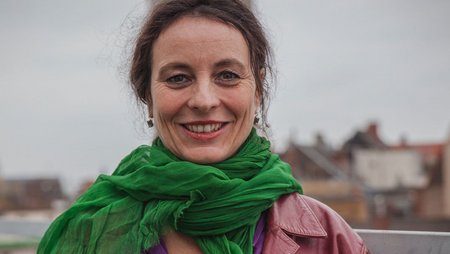Threats and violence against activists and women’s rights organisations are increasing - The scope for action for women’s rights work worldwide is being further restricted.

“We have long been concerned about a visible escalation in violence and the lack of a clear response from state institutions,” says Sofija Todorović, Programme Director at the Serbian organisation YIHR (Youth Initiative for Human Rights). As an activist, she was threatened in August this year. Sexist hate messages were written on the façade of her house in Belgrade along with her full name.
“This attack is a clear indication of an intent to intimidate activists to the point where even in their own homes or neighbourhoods they no longer feel safe.”
This situation in Serbia is just one example, but it exemplifies a new level of danger for women’s rights activists, their organisations and their work.
Iraq: Hate speech on social media
In Iraq, partner organisations are reporting death threats, hate speech directed against them on social media, and increasingly frequent verbal attacks on their staff.
In Sierra Leone, civil society activities have declined sharply since the high point of the “Black Tuesday Movement” in 2019. Activists report that peaceful demonstrations have been violently broken up several times and protests have been suppressed. Activists who pressed their positions during election campaigns were defamed or illegally imprisoned. In addition, there have been arson attacks and attempted murders. Some of these even targeted women who stood as candidates for the opposition. In this atmosphere of insecurity and fear, it becomes much more difficult to actively contribute to civil society and advocate for women’s rights.
Women’s rights issues less visible
In Bosnia and Herzegovina, new restrictive laws limit press freedom and access to information. This can result in a lack of visibility for women’s rights issues, less space for criticism of discriminatory structures, and the risk of misinformation and instrumentalisation. The President of Republika Srpska is also planning a law that will further restrict the work of non-governmental organisations. Organisations that receive financial support from abroad would have to register this, would be defamed as “foreign agents”, and would be subject to restrictions and other regulations that would endanger their work and possibly even their existence.

“Due to the patriarchal structures in most societies, women’s rights activists and their organisations are particularly affected by these forms of political harassment and restrictions related to human rights. If nothing is done about this, civil society’s scope for action will continue to shrink.”
“medica mondiale is calling for protection and political and financial support for women’s rights organisations and activists,” says Fezer.
“In terms of a feminist foreign policy and development cooperation, it is important not to abandon them during their acute situations of being threatened, but to provide them with targeted, specific and unbureaucratic support.”


